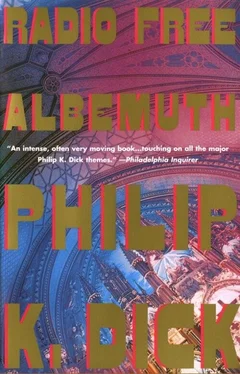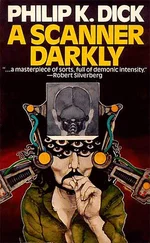Philip Dick - Radio Free Albemuth
Здесь есть возможность читать онлайн «Philip Dick - Radio Free Albemuth» весь текст электронной книги совершенно бесплатно (целиком полную версию без сокращений). В некоторых случаях можно слушать аудио, скачать через торрент в формате fb2 и присутствует краткое содержание. Жанр: Фантастика и фэнтези, на английском языке. Описание произведения, (предисловие) а так же отзывы посетителей доступны на портале библиотеки ЛибКат.
- Название:Radio Free Albemuth
- Автор:
- Жанр:
- Год:неизвестен
- ISBN:нет данных
- Рейтинг книги:4 / 5. Голосов: 1
-
Избранное:Добавить в избранное
- Отзывы:
-
Ваша оценка:
- 80
- 1
- 2
- 3
- 4
- 5
Radio Free Albemuth: краткое содержание, описание и аннотация
Предлагаем к чтению аннотацию, описание, краткое содержание или предисловие (зависит от того, что написал сам автор книги «Radio Free Albemuth»). Если вы не нашли необходимую информацию о книге — напишите в комментариях, мы постараемся отыскать её.
Radio Free Albemuth — читать онлайн бесплатно полную книгу (весь текст) целиком
Ниже представлен текст книги, разбитый по страницам. Система сохранения места последней прочитанной страницы, позволяет с удобством читать онлайн бесплатно книгу «Radio Free Albemuth», без необходимости каждый раз заново искать на чём Вы остановились. Поставьте закладку, и сможете в любой момент перейти на страницу, на которой закончили чтение.
Интервал:
Закладка:
In all its activity of continually re-creating the universe, -improving and shaping within the constant flow, the artisan employed the most economical means possible. Although it drew on everything, arranging it and most of all joining otherwise separate sections into totally new and unexpected entities, it took only what it absolutely needed. Thus its reshaping process took place within the universe, turning the universe into a kind of gigantic warehouse of parts, an almost infinite stockpile, in which ihe agency could find anything it desired.
The temporal process, it seemed to me, was a medium by which this proliferation of forms was capable of taking place, for the benefit, ultimately of this shaping entity, which, I could see, moved backward through time from the far end of the universe. The plan by which the shaping entity worked seemed to be the form of the entity itself, as if it were transforming the sprawling, chaotic universe into a stupendous replica of its own eidos - form. But of this I couldn't be sure; the enormity of its creation made the distant outlines, both in terms of space and of time, beyond my scope. It was creating around me and right past me, as I sat there.
Once more the impression had begun to come over me by slow degrees that I was in Rome, not in Orange County, California. I sensed the Empire without seeing it, sensed a vast iron prison in which human slaves toiled. I saw as if superimposed on the black metal walls of this huge prison certain rapidly scurrying figures in gray robes: enemies of the Empire and its tyranny, a remnant opposed to it. And I knew, from a deep internal clock down within my own self, that the true time was A.D. 70, that the Savior had come and gone but would soon return. The gray-robed hurrying remnant, with a feeling of joy, awaited and prepared for his return.
Overwhelmed with this, I experienced, too, a barrage of foreign words flooding through my head, words I did not understand but whose impression was clear in any case: I was in deadly danger from the spies of Rome, from those angry armed men who moved everywhere, detecting anything opposed to the imperial glory. I had to be alert, watch what I said, guard with sealed lips the secret that was mine: my link to the intergalactic communications network and Valis himself. Aware of this link, the Roman agents would kill me in an instant; it was Empire policy.
It was an ancient fight I was in, not a new one; it had been fought without cease for two thousand years. Names had changed, faces had changed, but the adversaries remained a permanent constant. The slave Empire against those who struggled for justice and truth - not freedom exactly, in the modern sense, but for virtues obscured today, buried under the bulk of an Empire that embraced both the United States and the Soviet Union as twin, equal manifestations. The US and the USSR, I understood, were the two portions of the Empire as divided up by the Emperor Diocletian for purely administrative purposes; at heart it was a single entity, with a single value system. And its value system was the concept of the supremacy of the state. The individual counted in its scales as nothing, and individuals who turned against the state and generated their own values were the enemy.
We were the enemy, we who wore the gray robes and waited with eager anticipation for our King to return. I saw the Savior not as a martyr who had died for us but as our legitimate King, who would return, claim his kingdom, and rule with justice and truth over his own people. An Empire ruled subject people, but our King ruled only his own. We would not be enslaved by him, forced to adopt the customs of the Empire; we would share his customs as our own; they were our own. And where his people ended, his rule ended; that was a rightful kingship compared to the tyranny of Caesar.
It would be necessary to teach my wife certain codes, the use of meaningful terms to notify her when one of the Romans was in our midst. We constituted a voluntary secret community, who scratched cryptic signs in the dust; we had special handshakes to identify ourselves to each other; collectively, we waited for the coming event to free us. Outwardly we appeared the same as Caesar's people, and that was our strength. The question that gripped us was not, Would our King return? but, Would we be able to survive against the Romans - by stealth, since we held no worldly power - until he returned? Or would he return to find us gone or, worse, assimilated into the customs of the Empire, our own memory of what we actually were lost forever - or, perhaps, lost until, by his return, he could restore such memories? Reawaken in sleeping men a forgotten knowledge of who they were... ?
I did not feel that it was a matter of my returning to a former life, of moving backward through time to some past existence. Rome was here now; it had invaded the landscape, rising up from within it, manifesting itself from its centuries-long place of inner concealment. Rather than me being back in the ancient world, Rome had revealed itself as the underlying reality of our present-day world; hidden still from the eyes of other Americans, it was nonetheless blatantly visible to me. The Empire had never died; it had only receded out of sight. My vision now enhanced by Valis, I saw Rome clearly as the landscape of our country; we had inherited it without realizing it. Stripped away were the mere accidental accretions; this was fundamental, what I saw now.
However much I hated Rome, I feared it more. My Inemory had become elongated, stretching out over a span of two thousand years, but what it encountered was a dreadful sameness: Rome lay spread out everywhere across the ages. What a giant entity it was, to extend that far in time. There lay no relief from it either in the past or the present, although in a sense I experienced no past, just a continual present of vast immensity.
So this was the antagonist ... or, rather, the physical manifestation of the antagonist. This was the corpus malus, the evil body; but within and behind it lay an evil spirit which had made the Empire what it was. Once it had been benign, but those days, when it had been a Republic - those had been swallowed up when free men had been swallowed up by the presence of oppression. How very much it weighed. Rome weighed down the world, armored as it was, huge with its black iron walls and cells and streets, its chains and rings of metal, its helmeted warriors. It seemed surprising that it had not sunk through the crust of the earth.
And now, in our midst at this latter time, the old battle continued on, the oppressor lying behind the iron body, striking at those who were not expressions of the Empire - ourselves, who served a King and walked other ways. We wore no armor, no metal, only the robes, sandals, and perhaps a golden fish in bracelet or necklace form. Our steps were lighter than those who complied with Roman customs, but we were vulnerable to death; we had no physical protection. Many of us had fallen already, to awaken later when the King returned. How soon would it be? Soon, but not yet. And when he returned he would not teach at the periphery of the Empire but would strike at its source, its heart; he would drive into its center and pull it down; this appearance of the King would be quite a surprise, quite a shock to the tyrant; quite different.
Before, the King had come quietly, at the margin of Roman affairs, simply to observe and to teach. He had not wished to be found by the Romans, cornered, tried, and murdered. That was the risk he had run and he had realized it. It was not his intention then to fight; he was King in identity, in spirit, but not in act. He had not died like Kings do but as criminals do, in disgrace. In the centuries since his dreadful murder he had lingered on, invisibly, with no body like ours, dancing outside our lives among the rows of newborn corn, dancing in the mists, pale and thin. People had seen him and mistaken him for a corn king, for the spirit of new life in the spring, the annual and permanent awakening after the death of winter. He had allowed them to imagine that he was nothing more; these were the centuries when knowledge of his real purpose was virtually lost. Mankind was acclimated to the idea of tyrannical rule. The King was visible only as mist itself, mist dancing in the mist, to bring the new crop to life; as if no men but only the corn now heard his voice.
Читать дальшеИнтервал:
Закладка:
Похожие книги на «Radio Free Albemuth»
Представляем Вашему вниманию похожие книги на «Radio Free Albemuth» списком для выбора. Мы отобрали схожую по названию и смыслу литературу в надежде предоставить читателям больше вариантов отыскать новые, интересные, ещё непрочитанные произведения.
Обсуждение, отзывы о книге «Radio Free Albemuth» и просто собственные мнения читателей. Оставьте ваши комментарии, напишите, что Вы думаете о произведении, его смысле или главных героях. Укажите что конкретно понравилось, а что нет, и почему Вы так считаете.









